Mob boss law, 30 mystery co-conspirators and an unmasked plot: Key takeaways Trump’s Georgia indictment
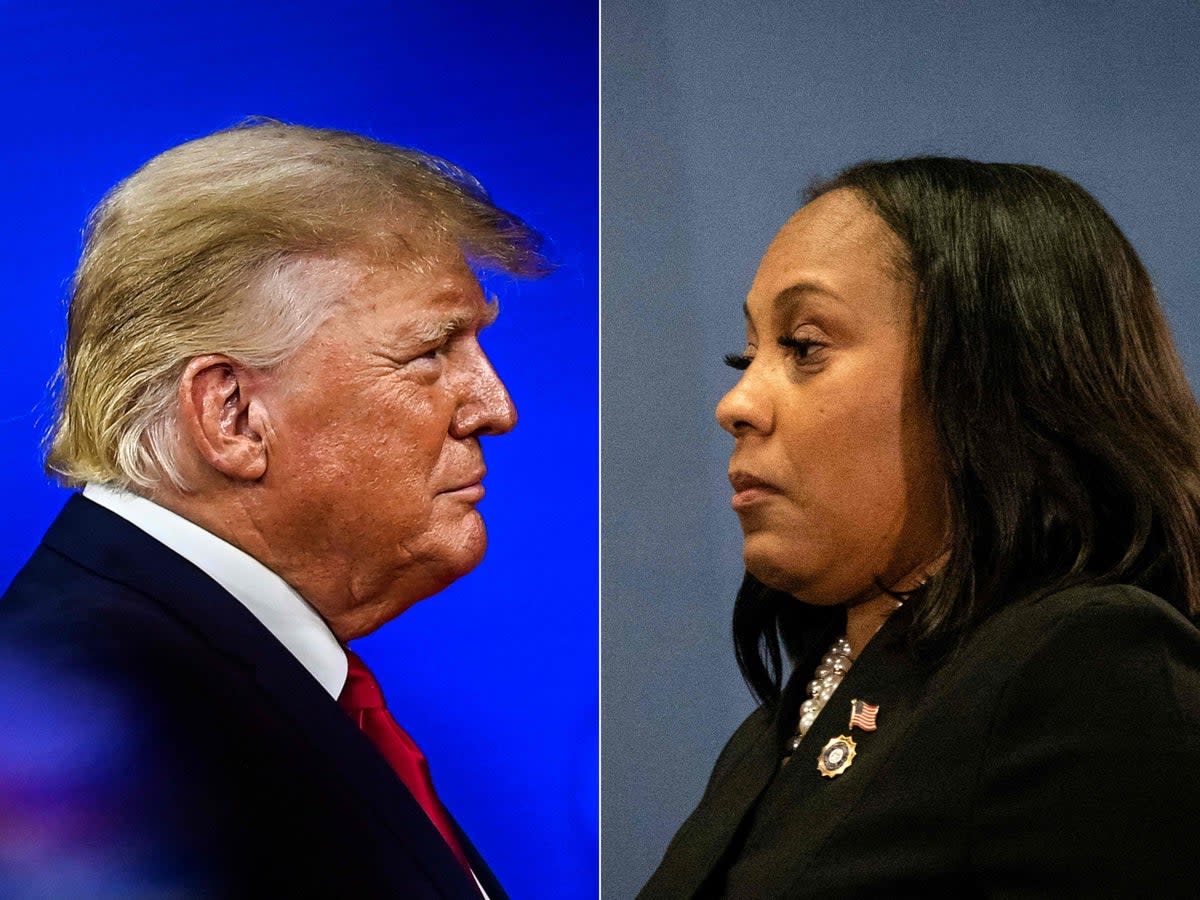
- Oops!Something went wrong.Please try again later.
- Oops!Something went wrong.Please try again later.
- Oops!Something went wrong.Please try again later.
Donald Trump has now been hit with his fourth criminal indictment – leaving him facing a combined 91 charges across two state and two federal cases and the prospect of the remainder of his life behind bars.
On 14 August, a grand jury in Fulton County, Georgia, returned an indictment charging the former president and 18 of his staunchest allies over their efforts to overturn the 2020 presidential election in the state.
“Defendant Donald John Trump lost the United States presidential election held on November 3, 2020,” the indictment reads.
“One of the states he lost was Georgia. Trump and the other Defendants charged in this Indictment refused to accept that Trump lost, and they knowingly and willfully joined a conspiracy to unlawfully change the outcome of the election in favor of Trump.
“That conspiracy contained a common plan and purpose to commit two or more acts of racketeering activity in Fulton County, Georgia, elsewhere in the State of Georgia, and in other states.”
In the sweeping indictment, Mr Trump was charged with 13 criminal counts: violating RICO’s statute, conspiracy to impersonate a public officer, two counts of conspiracy to commit forgery, two counts of conspiracy to make false statements under oath, two counts of conspiracy to file false documents, two counts of solicitation of a public officer, filing false documents, conspiracy to solicit false statements, and making false statements.
Former New York City mayor Rudy Giuliani was also hit with 13 charges, while the other alleged accomplices – including former White House chief of staff Mark Meadows, “Kraken” lawyer Sidney Powell and Kanye West’s former publicist Trevian Kutti – face fewer charges.
Here’s some of the key takeaways from the sweeping 98-page indictment:
Trump and allies charged under mob boss law
Charged under Georgia’s Racketeer Influenced and Corrupt Organizations (RICO) statute, the 19 defendants are accused of running a criminal enterprise with the goal of ensuring that Mr Trump remained in power at all costs.
The RICO statute is a Richard Nixon-era racketeering law originally passed to prosecute organised crime groups and mafia crime syndicates.
In brief, it allows prosecutors to bring different charges against multiple individuals who are all engaging in criminal activity for the purpose of a criminal end goal.
All 19 of the defendants were charged with violating Georgia’s RICO statute.
The indictment accuses Mr Trump and his allies of orchestrating and running a criminal enterprise in Fulton County, Georgia, and elsewhere, to “accomplish the illegal goal of allowing Donald J. Trump to seize the presidential term of office, beginning on January 20, 2021”.
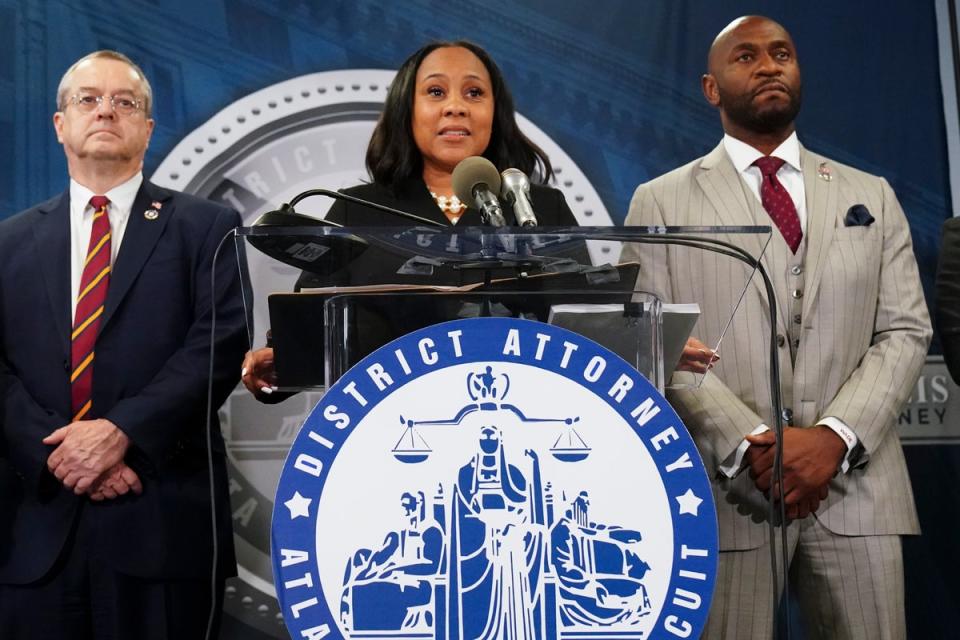
“This criminal organization constituted an enterprise as thatterm is deï¬ned in O.C.G.A. § l6-14-3(3), thatis, a group of individuals associated in fact. The Defendants and other members and associates ofthe enterprise had connections and relationships with one another and with the enterprise,” it reads.
The criminal organisation’s members and associates “engaged in various related criminal activities including, but not limited to, false statements and writings, impersonating apublic ofï¬cer, forgery, ï¬ling false documents, inï¬uencing witnesses, computer theft, computer trespass, computer invasion of privacy, conspiracy to defraud the state, acts involving theft, and perjury”.
Fulton County District Attorney Fani Willis has previously used the RICO statute to bring sweeping charges last year against a gang which engaged in a high-profile string of robberies.
The use of the RICO statute is somewhat ironic for one of the defendants, Mr Giuliani, given he made his name as a former US attorney who prosecuted organised crime groups using that very same act.
In the bio on his “freedom fund” page – which seeks donations – he boasts that he “pioneered the use of the RICO statute to take massive businesses away from not only the Mafia but other organized crime and illegal drug groups, crooked Wall Street con men, corrupt politicians from Congresspeople to many city, state and federal officials”.
30 mystery co-conspirators
While Mr Trump and 18 of his close allies have all been hit with charges for their involvement in the criminal enterprise, the indictment also mentions another 30 mystery co-conspirators.
These alleged co-conspirators are not named in the indictment but are simply referred to as “co-conspirators Individual l through Individual 30”.
These individuals have not been charged with any crime, but are alleged to be part of the criminal organisation which engaged in criminal activities to keep Mr Trump in office.
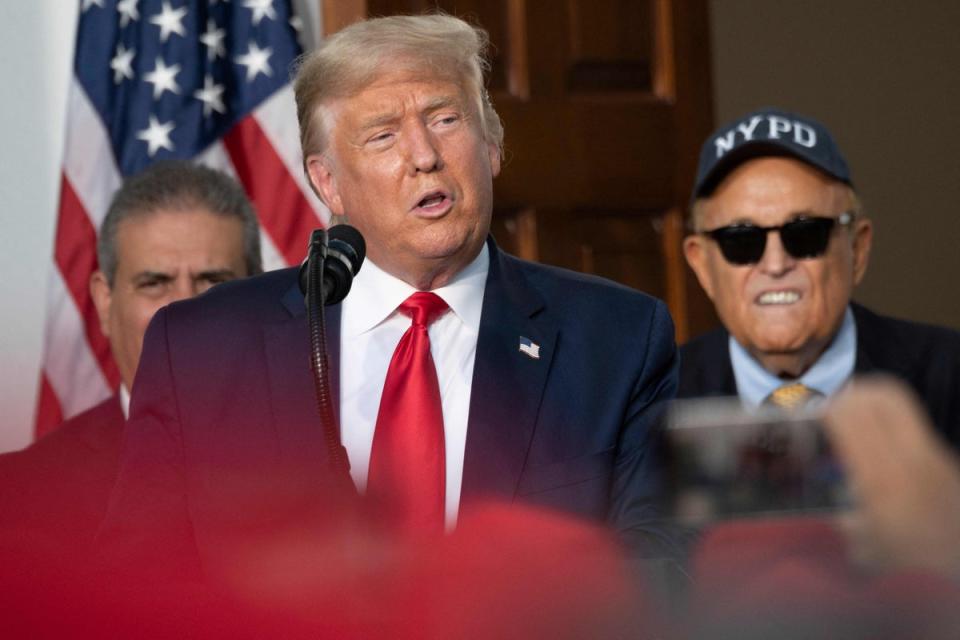
“Defendants Donald John Trump, Rudolph William Louis Giuliani, John Charles Eastman, Mark Randall Meadows, Kenneth John Chesebro, Jeffrey Bossert Clark, Jenna Lynn Ellis, Ray Stallings Smith III, Robert David Cheeley, Michael A. Roman, David James Shafer, Shawn Micah Tresher Still, Stephen Cliffgard Lee, Harrison William Prescott Floyd, Trevian C. Kutti, Sidney Katherine Powell, Cathleen Alston Latham, Scott Graham Hall, Misty Hampton, unindicted co-conspirators Individual l through Individual 30, and others known and unknown to the Grand Jury, constituted a criminal organization whose members and associates engaged in various related criminal activities including, but not limited to, false statements and writings, impersonating a public ofï¬cer, forgery, ï¬ling false documents, inï¬uencing witnesses, computer theft, computer trespass, computer invasion of privacy, conspiracy to defraud the state, acts involving theft, and perjury,” the indictment reads.
The identities of some of the alleged co-conspirators are easier to work out than others.
For example, the indictment refers to a 15 November 2020 phone call made by Mr Giuliani to unindicted co-conspirator Individual 2 in which he left a roughly 83-second-long voicemail message “making statements concerning fraud in the November 3, 2020, election in Fulton County, Georgia”.
It has previously been reported that Mr Giuliani tried to leave a voicemail message that day for Senator Tommy Tuberville – but accidentally called the wrong number.
While the identities of many of the alleged unindicted co-conspirators remain unclear, the other mystery is why these 30 individuals have not been charged with the other 19 members of the alleged criminal enterprise – and whether they could be hit with charges down the line.
Bizarre link to Kanye West
The indictment reveals a bizarre link between the alleged criminal enterprise and Kanye West as one of Mr Trump’s 18 co-defendants used to be a member of the rapper’s inner circle.
Trevian Kutti, 51, used to work as West’s publicist.
In the sweeping indictment, unsealed on 14 August, prosecutors allege that Mr Kutti was recruited by co-defendant Harrison Floyd and travelled from Chicago, Illinois, to Atlanta, Georgia, to try to make contact with Ruby Freeman.
Ms Freeman was a Fulton County election worker who was falsely accused of election fraud by Mr Trump’s allies – and faced a slew of harassment because of it.
Mr Kutti traveled to Ms Freeman’s home in Cobb County, Georgia, on 4 January 2021 – two days before the Capitol riot and the certification of the electoral votes – but failed to contact her, the indictment alleges.
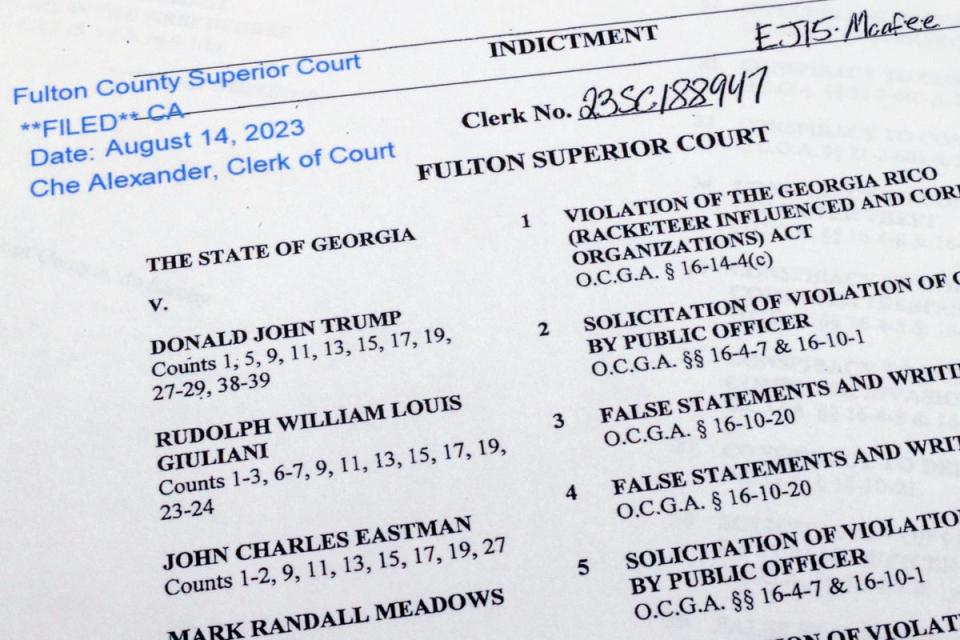
He then allegedly called Ms Freeman and told her she was in danger but that he could help her.
Prosecutors allege that Mr Kutti tried to pressure Ms Freeman into admitting false claims of fraud – warning her she would face arrest if not. This was part of one of the key aspects of the criminal enterprise which focused on pressuring election workers and officials to aid in efforts to overturn the election.
Trump’s tweets come back to haunt him
The evidence laid out in the indictment includes public comments, phone calls, White House meetings and, of course, the speeches Mr Trump and some of his allies gave to his supporters moments before a mob stormed the US Capitol.
But there’s another thing that has particularly come back to haunt Mr Trump: his tweets.
Dozens of his tweets are cited as part of the 41 criminal counts in the indictment.
Among the most notable were Mr Trump’s tweets on the morning of 6 January 2021.
“If Vice President @Mike_Pence comes through for us, we will Win the Presidency. Many States want to decertify the mistake they made in certifying incorrect & even fraudulent numbers in a process NOT approved by their State Legislatures (which it must be). Mike can send itback!” he wrote.
In another tweet, he wrote: “States want to correct their votes, which they now know were based on irregularities and fraud, plus corrupt process never received legislative approval. All Mike Pence has to do is send them back to the States, AND WE WIN. Do it Mike, this is a time for extreme courage!”
The indictment says that both of these tweets were “an overt act in furtherance of the conspiracy”.
Mr Trump was banned from Twitter following the January 6 Capitol riot – prompting him to launch his own Truth Social platform where he continues to unleash his unchecked rants. His Twitter account was reinstated in November by the platform’s new boss Elon Musk.
Voting equipment breach revealed
The indictment lays out details of a little-known plot to breach the voting systems in Coffee County, Georgia – unlawfully accessing private voter data as part of an attempt to try to prove election fraud.
“Kraken” lawyer Sidney Powell was a key player in this plot which continued long after the Capitol riot and President Joe Biden’s inauguration – with prosecutors outlining alleged racketeering activity through January, February and April 2021.
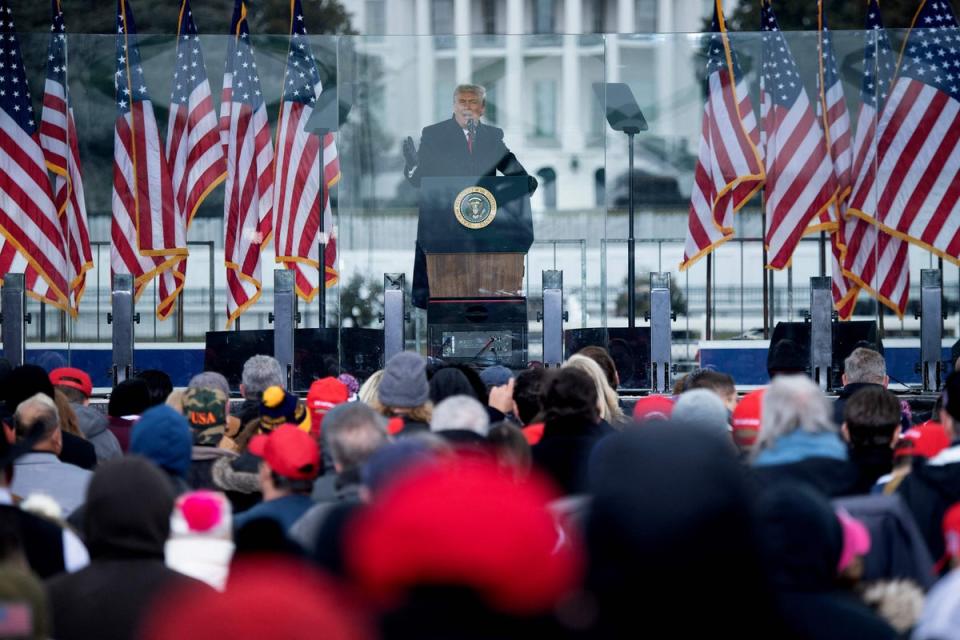
According to the indictment, unindicted co- conspirators “unlawfully accessed certain data copied from Dominion Voting Systems equipment at the Coffee County Board ofElections & Registration Oï¬ice in Coffee County, Georgia, by downloading said data from a server maintained by Sullivan Strickler LLC”.
Co-defendant Misty Hampton also allowed unindicted co-conspirators to access non-public areas of the Coffee County elections office and access the Dominion Voting Systems equipment, the indictment alleges.
Trump ally admitted they couldn’t legally overturn election before Jan 6
In a meeting two days before the January 6 Capitol riot, one of the key players in the alleged criminal enterprise admitted that they could not legally overturn the election, according to the indictment.
On 4 January 2021, Mr Trump and attorney and co-defendant John Eastman met with then-vice president Mike Pence, Mr Pence’s chief of staff Marc Short and Mr Pence’s counsel Greg Jacob in the White House Oval Ofï¬ce.
During the meeting, prosecutors allege that Mr Trump and Mr Eastman pushed Mr Pence to either reject electoral votes from certain states or delay the joint session of Congress on 6 January – when the electoral college votes would be certified for President Joe Biden.
This was part of a key part of the plot to keep Mr Trump in power, which focused heavily on pressuring Mr Pence and falsely claiming to the American people that he had the power to stop Mr Biden from taking office.
Yet, despite these public claims, the indictment alleges that Mr Eastman knew this was not the case and admitted this in the meeting attended by Mr Trump.
“During the meeting, John Charles Eastman admitted both options violatedthe Electoral Count Act. This was an overt act in furtherance of the conspiracy,” the indictment alleges.

